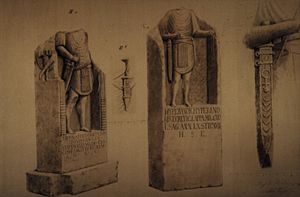Tiberius Julius Abdes Pantera facts for kids
Tiberius Julius Abdes Pantera (born around 22 BC – died around AD 40) was a soldier from the Roman army. He was born in Sidon, a city in Phoenicia (which is now part of Lebanon). His tombstone was found in Bingerbrück, Germany, in 1859. For a long time, some scholars have wondered if this soldier might be connected to Jesus. This idea comes from an ancient Greek writer named Celsus. According to another writer, Origen, Celsus wrote a book called The True Word. In this book, Celsus claimed that Jesus was the son of Mary and a Roman soldier.
Celsus's original book is now lost. We only know about it because Origen wrote about it, trying to explain why Celsus's ideas were wrong. Most experts today think it's very unlikely that Pantera was Jesus's father. There isn't much proof for this idea outside of some old Greek and Jewish stories. The name Pantera was actually quite common among Roman soldiers back then.
Contents
Pantera's Tombstone
Finding the Tombstone
In October 1859, workers were building a railroad in Bingerbrück, Germany. They accidentally found nine tombstones belonging to Roman soldiers. One of these was the tombstone of Tiberius Julius Abdes Pantera. Today, you can see his tombstone at the Römerhalle museum in Bad Kreuznach, Germany.
What the Tombstone Says
The words carved on Abdes Pantera's tombstone tell us about him. Here's what it says:
|
|
Scholarly Views on the Connection to Jesus
Many scholars have looked into the idea that Tiberius Julius Abdes Pantera might be connected to Jesus. Most of them believe this story is not based on real historical facts.
For example, scholar Raymond E. Brown said that the story about Pantera being Jesus's father is a made-up explanation. He noted that there is very little historical proof for it.
Some researchers, like James Tabor, suggested that the information from Celsus about Jesus's father might be true. Tabor thought that a soldier with this name could have been in Judea around the time Jesus was born. However, Tabor did not have strong evidence to support this idea. Other experts, like Maurice Casey and Christopher Zeichmann, have disagreed with Tabor. They point out that there is no proof Pantera was ever in the region where Jesus lived.
Writers Bruce Chilton and Craig A. Evans have studied old Jewish stories about Jesus, such as the Toledot Yeshu. They explain that these stories were often created to argue against Christian beliefs. They say these stories don't offer real historical facts about Jesus. The Blackwell Companion to Jesus also states that the Toledot Yeshu has no historical facts. It might have been created to stop people from becoming Christians.
Most Christian and Jewish scholars over the years have not paid much attention to the Toledot Yeshu. Robert E. Van Voorst says we don't know exactly when these stories were first written. He believes they likely appeared after the 4th century. This means they are too new to contain true memories of Jesus. The Toledot Yeshu often makes fun of the Christian gospels. For example, it claims that Apostle Peter pretended to be Christian to separate Christians from Jews. It also shows Judas Iscariot as a hero who pretended to be Jesus's follower to stop Christians.
See also
 In Spanish: Tiberio Julio Abdes Pantera para niños
In Spanish: Tiberio Julio Abdes Pantera para niños
- Historical Jesus
- Historicity of Jesus
- Julia gens
- The True Word
- Toledot Yeshu
- Yeshu


